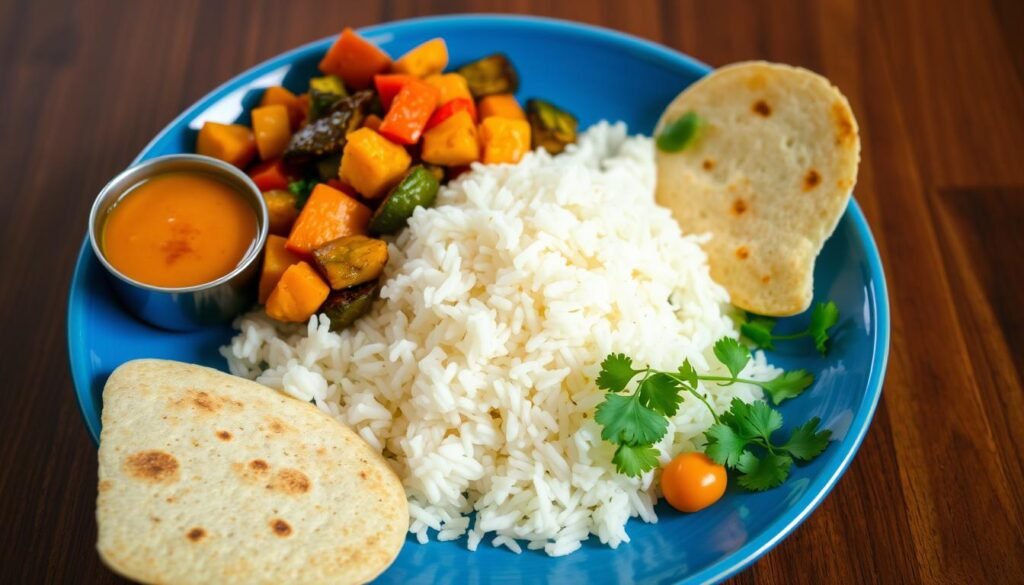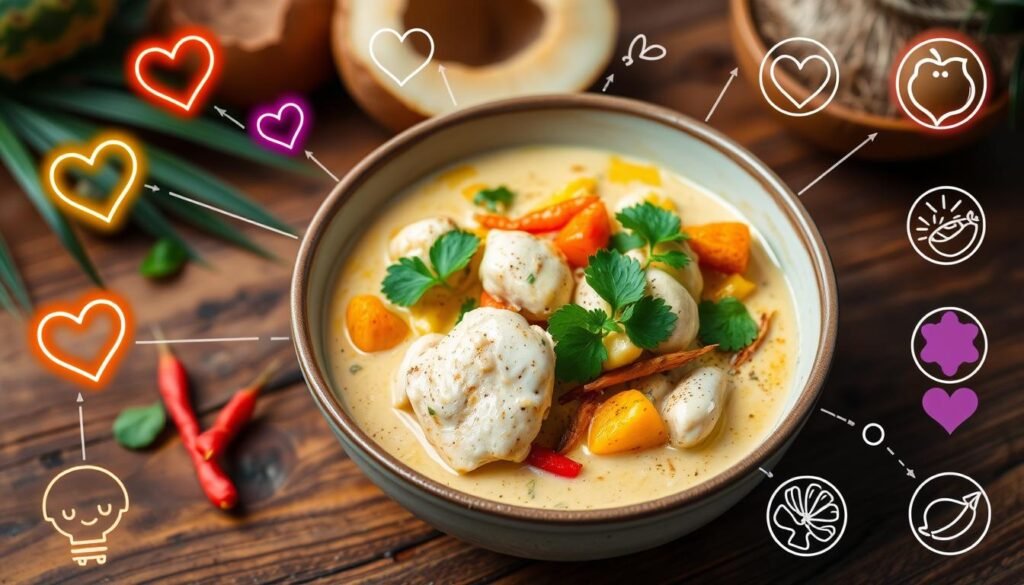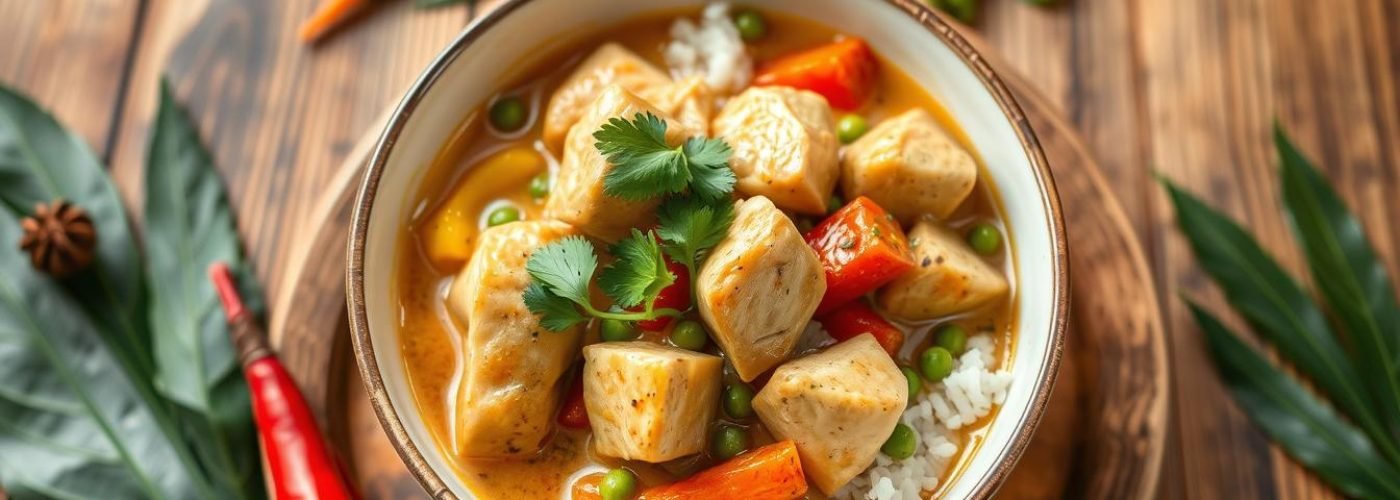Coconut Curry Chicken is a delightful dish that brings together tender pieces of chicken simmered in a creamy coconut sauce, enriched with aromatic spices and fresh herbs. This Coconut Curry Chicken recipe has gained popularity for its delicious flavor and ease of preparation, making it a fantastic option for weeknight dinners or special gatherings. Whether you’re looking for an easy curry chicken that pairs well with rice or an exciting way to incorporate coconut milk chicken into your meal rotation, this dish satisfies all cravings.
With its versatility and comforting taste, Coconut Curry Chicken is sure to become a staple in your collection of dinner recipes. Let’s dive deeper into its origins, key ingredients, and how you can make this wonderful dish at home!
What is Coconut Curry Chicken?
Coconut Curry Chicken is a delightful dish that merges tender chicken pieces with the creamy richness of coconut milk, creating a meal infused with flavor. This dish finds its roots in Southeast Asian cuisine, particularly influenced by the culinary traditions of Indian and Thai curry. Understanding its origins offers a deeper appreciation of the history of Coconut Curry Chicken and its significant role in various cultures.
Origins and Cultural Significance
The origins of Coconut Curry Chicken can be traced back to the diverse culinary practices of Southeast Asia. Indian and Thai curry dishes often incorporate coconut milk, making it a fundamental ingredient that provides a unique taste profile. Each culture brings its own techniques and spices, reflecting rich regional traditions. The vibrant flavors tell a story and connect people through shared culinary experiences.
Flavor Profile
The flavor profile of coconut curry is a captivating blend of savory, sweet, and spicy notes. Fresh herbs, such as cilantro and basil, play a vital role in enhancing the overall taste. Aromatic spices, combined with the creamy texture of coconut milk, create a satisfying sensation that engages the palate. The balance of ingredients serves to elevate the dish, making Coconut Curry Chicken a favorite among curry enthusiasts.
Key Ingredients for Coconut Curry Chicken
Creating a delicious Coconut Curry Chicken relies heavily on the choice of ingredients. These elements contribute significantly to the dish’s flavor, texture, and aroma, making it a favorite among many. Understanding each component can transform your cooking experience.
Fresh Herbs and Spices
The vibrant flavors in Coconut Curry Chicken primarily come from fresh herbs and spices. Key herbs like cilantro and basil add a refreshing kick, while a well-crafted spice blend for curry chicken, including turmeric, cumin, and coriander, brings warmth and complexity. These spices not only enhance the dish’s flavor but also provide health benefits, making each bite satisfying.
The Importance of Coconut Milk
When preparing Coconut Curry Chicken, fresh coconut milk stands out as an essential ingredient. Its creamy texture enriches the dish, allowing the spices to meld beautifully. The use of high-quality fresh coconut milk elevates the entire meal, making it a delightful experience to savor.
Choosing the Right Chicken
For optimal results, selecting the right chicken is crucial. Boneless, skinless chicken thighs are ideal due to their tenderness and rich flavor profile. Unlike chicken breast, thighs retain moisture during cooking, ensuring every piece is juicy and flavorful. Combining these elements, your Coconut Curry Chicken will shine in both taste and presentation.
| Ingredient | Function | Notes |
|---|---|---|
| Fresh Coconut Milk | Provides creaminess | Use high-quality for best results |
| Cilantro | Adds freshness | Chopped for garnish |
| Basil | Enhances aroma | Can be used sprigs or chopped |
| Turmeric | Color and warmth | Promotes anti-inflammatory properties |
| Cumin | Depth of flavor | Adds earthy notes |
| Coriander | Brightness | Adds a citrus-like flavor |
| Boneless Chicken Thighs | Protein source | Preferred for moisture and taste |
Step-by-Step Recipe for Coconut Curry Chicken
Preparing Coconut Curry Chicken is not only delicious but also remarkably efficient. The entire process can be completed in under an hour, making it perfect for a weeknight dinner. The preparation time for curry chicken is approximately 15 minutes, while the actual cooking time is around 30 minutes.
Preparation Time and Cooking Time
Here’s a brief overview of the time required:
| Action | Time Required |
|---|---|
| Preparation Time | 15 minutes |
| Cooking Time | 30 minutes |
| Total Time | 45 minutes |
Gathering Your Ingredients
For a successful cooking experience, gather the following ingredients:
- Fresh chicken
- Coconut milk
- An assortment of spices (like curry powder, turmeric, and cumin)
- Onion
- Garlic
- Ginger
- Fresh herbs (such as cilantro or basil)
Having everything ready before you start will greatly enhance the flow of your cooking. This preparation for curry chicken will ensure a smooth process and allow all the flavors to come together beautifully.
Instructions for Cooking Coconut Curry Chicken
Creating the perfect Coconut Curry Chicken involves a few essential steps that bring out its rich flavors. Follow these detailed cooking instructions for Coconut Curry Chicken to enjoy each delicious bite.
Marinating the Chicken
Start by marinating chicken for curry. Use a combination of yogurt or coconut milk, along with spices such as turmeric, cumin, and coriander. Coat the chicken thoroughly and let it marinate for at least 30 minutes. This process enhances the flavor and tenderness of the meat.
Cooking the Base
In a large skillet or pot, heat some oil over medium heat. Sauté chopped onions, minced garlic, and grated ginger until they become fragrant. Stir in your choice of curry powder or paste, letting the spices bloom in the oil. This step forms the flavor base for your dish.
Combining Ingredients
Add the marinated chicken to the skillet and mix well with the sautéed base. Pour in the coconut milk, allowing it to create a creamy, rich sauce. Let everything simmer on a low heat until the chicken is cooked through, about 20-30 minutes. Stir occasionally to prevent sticking.
Serving Suggestions
When ready to serve Coconut Curry Chicken, pair it with steaming rice or warm naan bread. Garnish with fresh herbs like cilantro or parsley for a vibrant touch. Enjoy this comforting dish as a meal that pleases the palate!
Macronutrient Breakdown of Coconut Curry Chicken
Coconut Curry Chicken offers a satisfying meal that balances taste and nutrition. Understanding the macronutrient composition can help individuals appreciate its health benefits while making informed dietary choices.
Caloric Content
A typical serving of Coconut Curry Chicken contains approximately 350 calories. This makes it a hearty yet manageable meal option for those managing their caloric intake. The dish, rich in flavor and nutrition, aligns well with various dietary preferences and goals.
Protein, Fat, and Carbohydrate Analysis
The protein content in Coconut Curry Chicken is notably high, thanks to the chicken itself. Each serving typically boasts between 25-30 grams of protein. This significant protein contribution supports muscle health and provides lasting energy throughout the day.
Fat content varies within the range of 15-20 grams, primarily derived from the use of coconut milk, which adds a creamy texture and rich flavor. For those mindful of their fat intake, this is an important aspect to consider. The combination of saturated and unsaturated fats offers some health benefits, especially when integrated into a balanced diet.
Carbohydrates are relatively low, averaging around 10 grams per serving, depending on the sides served with the dish. This makes Coconut Curry Chicken a suitable option for individuals monitoring their carbohydrate consumption.
| Macronutrient | Amount per Serving |
|---|---|
| Calories | 350 |
| Protein | 25-30 grams |
| Fat | 15-20 grams |
| Carbohydrates | Approximately 10 grams |
The comprehensive macronutrient analysis of curry chicken reveals its potential as a nutritious meal option. The combination of protein, healthy fats from coconut milk, and low carbohydrates underscores the coconut curry chicken health benefits, making it a flavorful choice for many dietary lifestyles.
Serving Variations for Coconut Curry Chicken
Coconut Curry Chicken offers a versatile canvas for flavors and textures. It pairs exceptionally well with various sides, enhancing the overall dish while offering an appealing presentation. Whether you’re entertaining guests or looking for a comforting meal, here are some delightful options.
Suggested Sides
For a well-rounded meal, consider these delightful sides for Coconut Curry Chicken:
- Jasmine rice
- Basmati rice
- Quinoa
- Steamed vegetables
- Garlic naan
These accompaniments complement the rich flavors of the curry and provide a substantial balance.
Vegetarian Alternatives
For those who prefer a plant-based option, a vegetarian Coconut Curry is an excellent choice. The use of ingredients that capture the essence of the dish makes it equally satisfying. Here are some great substitutes:
- Chickpeas
- Tofu
- Bell peppers
- Carrots
- Cauliflower
These swaps will ensure that the rich coconut flavor remains intact while catering to diverse dietary preferences.

Common Mistakes to Avoid
Cooking Coconut Curry Chicken can be a delightful experience, yet it’s easy to encounter some common pitfalls. Avoiding these mistakes in cooking curry chicken ensures a dish that not only tastes great but also impresses your guests.
Overcooking the Chicken
One of the primary mistakes in cooking curry chicken lies in overcooking the chicken. This can lead to a tough and dry texture, which detracts from the overall enjoyment of the dish. To maintain the chicken’s juiciness, aim for a cooking time of about 15-20 minutes for boneless chicken, ensuring it’s cooked through but still tender.
Adjusting Spice Levels
When learning how to cook Coconut Curry Chicken, gradually adjusting spice levels is crucial. Adding too much spice at once can easily overpower the flavors and ruin the balance of the dish. Start with a small amount and taste as you go, keeping track of the taste preference for both you and your diners. This way, the intricate flavors of the coconut and spices harmonize beautifully rather than clash.
| Mistake | Consequence | Tip to Avoid |
|---|---|---|
| Overcooking the Chicken | Tough, dry texture | Monitor cooking time closely |
| Adding Too Much Spice | Overpowering flavors | Adjust spices gradually |
Tips for Storing and Reheating Leftovers
After enjoying a delicious serving of Coconut Curry Chicken, you may find yourself with leftovers. Proper storage and reheating techniques ensure that the flavor remains intact and the chicken stays tender. Here are some helpful guidelines for storing Coconut Curry Chicken and reheating curry chicken safely.
Proper Storage Techniques
For optimal freshness, place the Coconut Curry Chicken in an airtight container. This method keeps moisture in and prevents bacterial growth. Store it in the refrigerator if you plan to consume it within three days. For longer shelf life, consider freezing the curry, which allows you to maintain its quality for up to three months.
Best Methods for Reheating
When ready to enjoy your leftovers, reheating curry chicken safely is essential for both taste and safety. You can use the stovetop for even warming, ensuring all ingredients are heated thoroughly. Alternatively, if you prefer the microwave, reheat in intervals of 30 seconds, stirring in between to avoid hotspots that can dry out the chicken.
Following these tips will help maintain the delectable taste of your Coconut Curry Chicken for future meals.
Health Benefits of Coconut Curry Chicken
Coconut Curry Chicken not only tantalizes the taste buds but also provides a variety of health benefits. Its nutrient-rich ingredients work together to offer valuable contributions to your diet. One standout is the health benefits of coconut milk, which serves as a base for this dish.
Nutrient-Rich Ingredients
The combination of ingredients in Coconut Curry Chicken contributes to its overall health benefits. Coconut milk is high in healthy fats and contains lauric acid, a compound with potential antibacterial and anti-inflammatory properties. This makes it an excellent choice for those looking to enhance their meals while prioritizing health. The chicken delivers a great source of protein, vital for muscle repair and filling meals.
Potential Anti-Inflammatory Properties
Fresh herbs and spices used in the recipe, such as turmeric and ginger, enrich the dish with antioxidants. These components may combat inflammation, further highlighting the benefits of chicken curry. By incorporating these nutritious elements, Coconut Curry Chicken allows you to enjoy a flavorful meal while supporting overall well-being.

| Ingredient | Nutritional Benefit |
|---|---|
| Coconut Milk | High in healthy fats, rich in lauric acid |
| Chicken | Excellent source of protein for muscle repair |
| Turmeric | Contains curcumin, with anti-inflammatory properties |
| Ginger | May help reduce inflammation and digestive issues |
Where to Find the Best Coconut Curry Chicken
If you’re on the quest for authentic Coconut Curry Chicken, your best bet is to explore local Southeast Asian restaurants and reputable Indian curry houses. These establishments often take pride in crafting dishes that are rich in flavor and steeped in tradition. Many also offer coconut curry takeout options, allowing you to savor this delightful meal in the comfort of your home.
When searching for the best restaurants for Coconut Curry Chicken, look for those known for their use of high-quality ingredients and adherence to traditional recipes. Many restaurants that specialize in Thai or Indian cuisine typically serve a version of this coconut-infused dish, which is beloved for its aromatic spices and creamy texture.
Don’t hesitate to ask locals for recommendations or check reviews online to identify which spots offer the best takeout. Whether dining in or enjoying a cozy night at home, indulging in Coconut Curry Chicken from a well-established eatery can be a truly rewarding experience for your palate.

